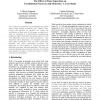Free Online Productivity Tools
i2Speak
i2Symbol
i2OCR
iTex2Img
iWeb2Print
iWeb2Shot
i2Type
iPdf2Split
iPdf2Merge
i2Bopomofo
i2Arabic
i2Style
i2Image
i2PDF
iLatex2Rtf
Sci2ools
HICSS
2006
IEEE
2006
IEEE
The Effect of Time Separation on Coordination Processes and Outcomes: A Case Study
Prior research has discussed and investigated how global teams bridge multiple boundaries (e.g., distance, time, culture) that separate its members and impact the coordination of their work. In this paper we report on a study we conducted at a semiconductor manufacturing company to better understand how global teams can work more effectively across one of these boundaries – time separation. More specifically, we investigate how time zones affect coordination costs and other coordination outcomes, and which coordination processes and mechanism are more effective in helping overcome the difficulties associated with time separation. The study was conducted through semi-structured interviews of 23 global team members working on technical projects in several locations around the globe.
Affect Coordination Costs | Biometrics | Global Team | HICSS 2006 | System Sciences | Time Separation |
Related Content
| Added | 11 Jun 2010 |
| Updated | 11 Jun 2010 |
| Type | Conference |
| Year | 2006 |
| Where | HICSS |
| Authors | J. Alberto Espinosa, Cynthia Pickering |
Comments (0)

